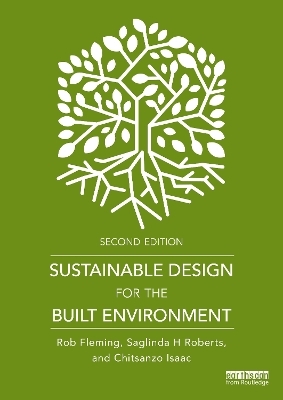
Sustainable Design for the Built Environment
Routledge (Verlag)
978-1-032-51082-8 (ISBN)
Sustainable Design for the Built Environment marks the transition of sustainable design from a specialty service to the mainstream approach for creating a healthy and resilient built environment. This groundbreaking and transformative textbook introduces sustainable design in a clear, concise, easy-to-read format.
This new edition includes fully updated exercises and online resources, an increased focus on diversity, equity, and inclusion in design, more international examples, perspectives, and approaches, enhanced full colour visuals, and additional resources for further study. The book takes the reader deep into the foundations of sustainable design, and creates a holistic and integrative approach addressing the social, cultural, ecological, and aesthetic aspects in addition to the typical performance-driven goals. The first section of this book is thematically structured around the origins, principles, and frameworks of sustainable design, aimed at inspiring a deeper, broader, and more inclusive view of sustainability. The second section examines strategies such as biophilia and biomimicry, adaptation and resilience, and health and well-being, including recent developments following the COVID-19 pandemic. The third section examines the application of sustainability principles from the global, urban, district and site, building, and human scales, illustrating how a systems thinking approach allows sustainable design to span varied contexts and multiple scales.
This textbook is intended to inspire a new vision for the future that unites human activity with natural processes to form a regenerative, coevolutionary model for sustainable design. Supported by additional resources including additional reading for each chapter and classroom assignments, this book will be essential reading for students of sustainability and sustainable design.
Rob Fleming is an award-winning educator, author, LEED® accredited professional, and architect. He is the Director of the Center for Professional Learning at the Weitzman School of Design, University of Pennsylvania, and the Director of Sustainability at FCA, an architecture and design firm in Philadelphia. Rob served as the 2023 AIA Philadelphia President, sits on the NCARB Education Committee, the AIA Higher Education Advisory Team, and is a jury member for the AIA COTE Student Design Competition. In Rob’s former life, he was the Founding Director of the MS in Sustainable Design Program at Thomas Jefferson University, one of the first programs of its kind in the world. Saglinda H Roberts is currently an Assistant Professor in the Masters of Sustainable Design program in the College of Architecture and the Buit Environment at Jefferson University, Philadelphia, USA, and has over 30 years' extensive design experience with a large variety of projects. Chitsanzo Isaac is a Researcher in Urbanism and Sustainability, Software Developer, and former Assistant Professor in Sustainable Design at Thomas Jefferson University, USA.
1. Space, time, and sustainable design 2. Environmental literacy for the sustainable designer 3. Motivations + Values for sustainable design 4. Integral sustainable design 5. The integrated design process 6. Bio-inspired design 7. Health + well-being 8. Resilience + adaption 9. Global scale sustainable design 10. Urban scale sustainable design 11. District and site scale sustainable design 12. Building scale sustainable design 13. Human scale sustainable design 14. Moving Forward
| Erscheinungsdatum | 11.09.2024 |
|---|---|
| Zusatzinfo | 29 Tables, black and white; 9 Line drawings, color; 44 Line drawings, black and white; 16 Halftones, color; 1 Halftones, black and white; 25 Illustrations, color; 45 Illustrations, black and white |
| Verlagsort | London |
| Sprache | englisch |
| Maße | 174 x 246 mm |
| Gewicht | 639 g |
| Themenwelt | Kunst / Musik / Theater ► Design / Innenarchitektur / Mode |
| Naturwissenschaften ► Biologie ► Ökologie / Naturschutz | |
| Naturwissenschaften ► Geowissenschaften ► Geografie / Kartografie | |
| Technik ► Architektur | |
| ISBN-10 | 1-032-51082-X / 103251082X |
| ISBN-13 | 978-1-032-51082-8 / 9781032510828 |
| Zustand | Neuware |
| Informationen gemäß Produktsicherheitsverordnung (GPSR) | |
| Haben Sie eine Frage zum Produkt? |
aus dem Bereich


